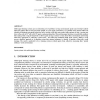Free Online Productivity Tools
i2Speak
i2Symbol
i2OCR
iTex2Img
iWeb2Print
iWeb2Shot
i2Type
iPdf2Split
iPdf2Merge
i2Bopomofo
i2Arabic
i2Style
i2Image
i2PDF
iLatex2Rtf
Sci2ools
126
click to vote
IADIS
2008
2008
Towards Mining for Influence in a Multi Agent Environment
Multi agent learning systems pose an interesting set of problems: in large environments agents may develop localised behaviour patterns that are not necessarily optimal; in a pure agent system there is no globally aware element which can identify and eliminate retrograde behaviour; and as systems scale they may produce large amounts of data, a system may have in the order of 106 cells with 105 agents, each generating data. This position paper introduces research that combines data mining with a logical framework to allow agents in large systems to learn about their environment and develop behaviours appropriate to satisfying system norms. We build from traditional multi agent systems, adding a novel process algebraic approach to co-operation using data mining techniques to identify co-operative behaviours worth learning. The result is predicted to be a learning system in which agents form collectives increasing their `mutual influence' on the environment. KEYWORDS Agent-systems, ...
Agent Learning Systems | IADIS 2008 | Internet Technology | Large Environments Agents | Multi Agent |
Related Content
| Added | 29 Oct 2010 |
| Updated | 29 Oct 2010 |
| Type | Conference |
| Year | 2008 |
| Where | IADIS |
| Authors | Robert Logie, Jon G. Hall, Kevin G. Waugh |
Comments (0)

